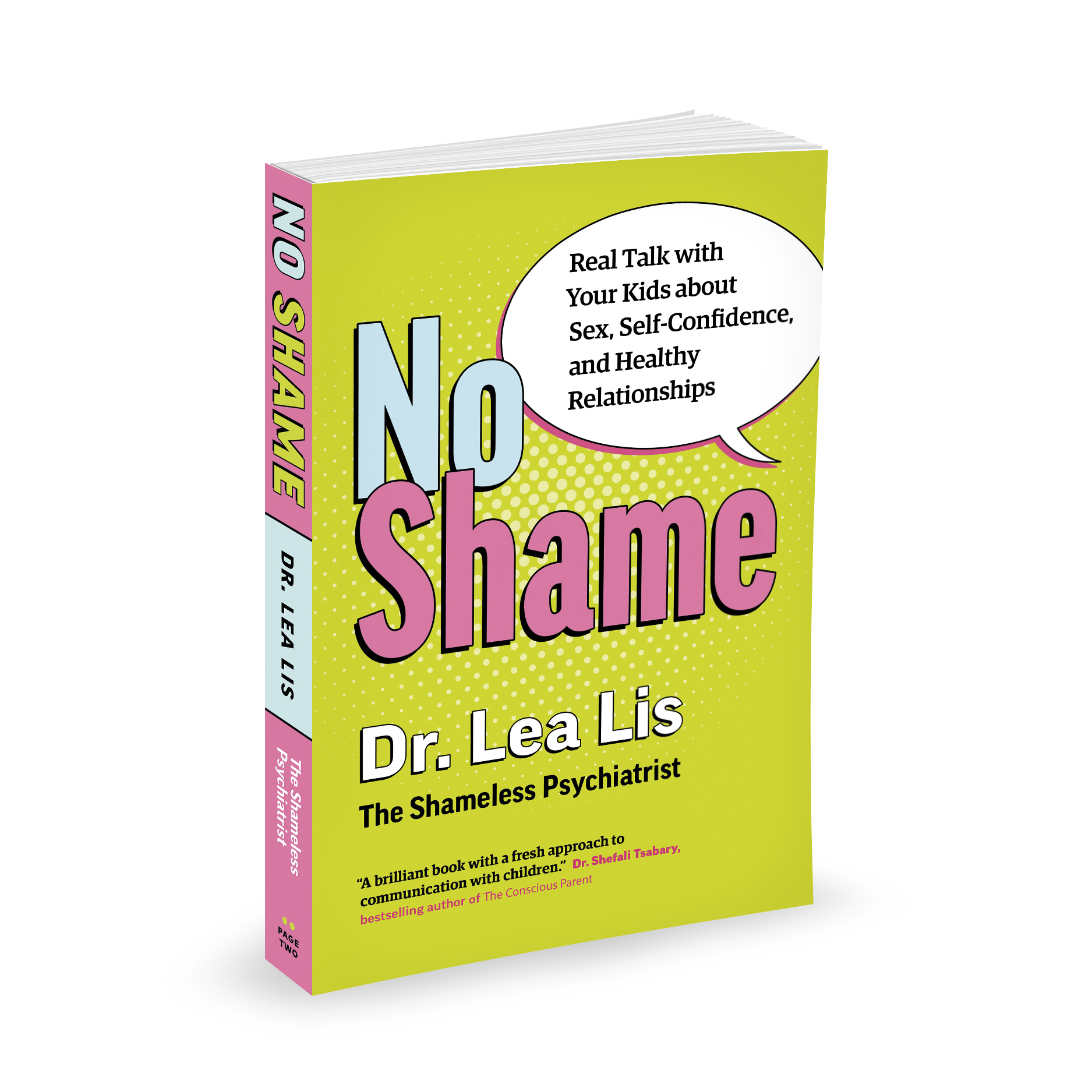No Shame should be compulsory reading for all parents.
It’s – without a doubt – the best parenting guide on how to talk to your kids and teens about sex I’ve ever read.
Written by ‘The Shameless Psychiatrist’, Dr Lea Lis, it teaches you how to do it easily, honestly and naturally.
Do what she suggests, and your kids will grow up to be sexually well-educated, body-positive, gender-respectful adults, have high self-esteem and enjoy happy, healthy sex lives and relationships.
No Shame was released a week or so ago and Dr Lea kindly let me choose 10 absolute gems of information to share here.
All the wisdom is hers though I’ve paraphrased here and there and added a few bits from my experience.
So here you have it: ten key points to remember when educating your child about sex.
It’s ‘vulva’ not ‘peepee’
Children should be taught the proper term for their genitals from the time they can understand language. Even before your child is talking, use the proper terms rather than slang or ‘cute’ terms. Both boys and girls should learn terms like ‘vulva’, ‘vagina’, ‘penis’, ‘testicles’.
Why? Naming body parts can prevent sexual abuse. A study of 91 sex offenders of children said they’d avoid children who knew the correct names of their body parts.
You can also then talk to them about what’s appropriate and what’s not, when interacting with other kids and adults.
Explain everything: reproduction, menstruation, birth
Kids are curious. They see things like tampon ads, animals having sex and going ‘on heat’. If you’re the one answering their questions, you can make sure they get accurate information.
Talk even more once they hit puberty
Ask your teen which sexual activities they’re engaging in. Asking questions is, of course, the most direct way to begin assessing how sexually active they are. Not just, “Have you ever been kissed?” but ‘Was it a boy or a girl?”.
If you’re recoiling in horror at the thought of asking your teenager this, it’s because you didn’t talk to them openly about sex when they were younger. It’s never too late to start: do it now. Ask indirectly. “What do you and your friends think about 15-year-olds having sex?’.
Watch the latest teen Netflix show to find out what teens are up to.
Talk to them about what’s happening on their social media. Be actively interested in their sex lives and relationships.
You won’t stop them having sex by not talking about it
Lots of parents don’t want to talk to their kids about sex because they think by doing so, they’ll encourage them to start doing it.
Quite the opposite will happen.
The less children know about sex, the more curious they are about it and likely to experiment.
I remember talking to a young teenager, for a TV show I did, who was hell bent on losing her virginity at the age of 15 to her boyfriend of three years. She wanted me to talk her through exactly what would happen. I did. By the end of the discussion, she decided intercourse wasn’t quite what she was expecting and decided to delay it a while.
Information doesn’t encourage teens, it simply prepares them.
Even if sex isn’t on their agenda, make sure they are educated about it for when it is. Talk about safe sex and condoms and contraception, STIs and periods, HPV vaccines.
Don’t forget to talk about pleasure
Talk about why masturbation is a great way to understand their own body and what gives them pleasure. How it can help teach them what types of touch feel comfortable, the pressure needed.
Explain that they will need to talk to their sexual partners about what feels good and what doesn’t. If a person is mature enough to have sex, they should be mature enough to have conversations about what they do and don’t like and what their boundaries are.
If your teens are sexually active, ask them, ‘Are you having orgasms?’. Especially if it’s a female who struggle more than men do.
Yes, they’ll squirm or tell you to sod off and mind your own business. But you’ve planted the seed by alerting them to things they should be thinking about.
Teach them about consent
Ideally, you’ll have talked to your child about how to avoid unwanted contact with others long before high school. But revisit it regularly.
Schools, workplaces, universities – they’re all taking sexual harassment and consent violations very seriously.
Parents should to.
What if my child or teen walks in on me having sex?
First up, make sure it doesn’t happen by locking the door, turning on loud music and teaching them that adults need privacy.
But if it does happen, stay calm. If you make it a big deal, they’ll make it a big deal. Talk about why they shouldn’t just walk in without knocking (if the privacy issue is your fault, accept responsibility), and ask that they give you some privacy. If they ask later what you were doing, say, “We were having sex, which is what grown-ups do when they care about each other. But we need privacy, so that’s why we lock the door or close it. Always knock”.
Make sure they understand it’s never too late to say no
There’s a brilliant list of comebacks your teen can use to get out of a situation if they’re feeling pressured or don’t want to have sex. It’s worth buying the book, purely for this alone.
Q: “If you really loved me, you’d have sex with me.”
Comeback: “If you really loved me, you wouldn’t try to make me do anything that I don’t want to do.”
They’re better having sex in their home than in a car or at a party
It’s guaranteed to divide a room full of parents, but Dr Lea and I agree totally on this one as well.
She believes teenagers have safer sex in their own home than in a car or at a party. Plenty get arrested for having sex in public, a bathroom or in a car. It’s humiliating for everyone and unnecessary.
Set rules though. They should be respectful of other family members, not do it in front of siblings, close and lock the door, put on music or keep quiet.
Teens have anal sex
Both LGBTQ+ and straight teens may consider having anal sex. It’s up to you to explain the literal ins and outs.
Explain it can be pleasurable. Tell them there’s no rush to do it, no matter what they’ve seen in porn. Tell them to wait until they’re really, really ready.
Also tell them this is one area of sex where there is a right and wrong way to do it. Find a good guide (here’s one I’ve written) and make sure they read it.
No Shame: Real talk with your kids about sex, self-confidence and health relationships by Dr Lea Lis is available wherever good books are sold.





